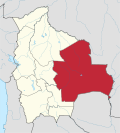Argentina
- Proposed state:
 Wallmapu [4] [5]
Wallmapu [4] [5] - Advocacy groups: Consejo de Todas las Tierras, [4] Resistencia Ancestral Mapuche, [5] Coordinadora Arauco-Malleco
- Proposed autonomous area: Rio Negro Province
- Political Party: Together We Are Río Negro
- Ethnic group: Tehuelche people and Mapuche
- Ethnic group: Toba people, Wichí
- Proposed: Autonomy for
 Formosa
Formosa
- Proposed: Autonomy for
Santa María Department [10] [11]
- Ethnic group: Diaguita
- Proposed: autonomy for the Diaguita in the Santa María Department
- Proposed: autonomy for
 Corrientes
Corrientes - Advocacy group: Partido Autonomista de Corrientes [16]
- Proposed: self determination for
 Buenos Aires Province [18] [19] [20] [21]
Buenos Aires Province [18] [19] [20] [21]
- Proposed: independence for the Center Region

